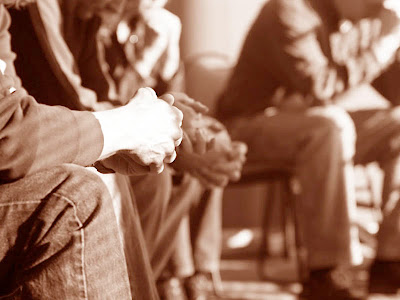I came across an article today in the Christian Post that discussed the first of a scheduled seven of Pastor Francis Chan's BASIC series. In this installment Chan is talking about praying. He addresses head-on why so many prayers go unanswered, finding the answer in the Scriptures- it's amazing what you find in holy writ when you read it: "You do not have, because you do not ask. You ask and do not receive, because you ask wrongly, to spend it on your passions. You adulterous people! Do you not know that friendship with the world is enmity with God?" (James 4:2b-4a ESV)
Chan compares his prayers with those of Jesus' earliest followers: "As I look at the way the disciples prayed back then and as I look at the way Jesus taught us to pray, I realize it’s a lot different from what I was taught. Prayer to them was really different, they asked for things that were different from what I typically asked for." His focus on the prayer of Jesus' earliest disciples made me call-to-mind the beginning of this year's Communion & Liberation Spiritual Exercises. The theme, or focus, of the exercises "Whoever Is In Christ Is A New Creation", taken from St. Paul's Second Letter to the Corinthians: "Therefore, if anyone is in Christ, he is a new creation. The old has passed away; behold, the new has come" (5:17 ESV).
At the very beginning of the Exercises, Fr. Carrón urged us to "try to identify with the disciples after Easter." Asking, "What prevailed in their hearts, in their eyes, in their self-awareness, if not His living presence?" Indeed, what prevailed in their hearts was Christ's presence and, Fr. Carrón insisted, His presence "was so evident for them that they could not rip it
away." Fr. Carrón asked, "Who of us would not desire such intensity of life?" Presumably, no one, at least nobody bothering to listen to people like Francis Chan and Julían Carrón. "But if we compare what the disciples experienced that week of Easter with what we have lived," Carrón continued, "we would all acknowledge the distance, the abysmal distance that separates us from the experience they had. This also holds for participation in the Liturgy: for them it was the moment of recognizing Him (their eyes were opened and they recognized Him), and for us it is often reduced to rite."
While Chan sees in James' letter the answer to the question, "Why prayers go unanswered," it is the Lord's Prayer that gives us not just a model of prayer, but speaks volumes about the content of prayer. He notes how we just say this prayer, without knowing what we are saying, or really, at least more often that we'd probably care to admit, without caring.
What he says is convicting. I was struck by his take on the phrase "lead us not into temptation but deliver us from evil":
“Haven’t you prayed that at times in your life when you were actually still were holding on to some temptation? Maybe you weren’t even ready to let go of all of your sin and yet you’re saying it. It’s like your words weren’t matching up to your heart.” I have and quite recently. As a matter of fact, as recently as last night.
While preaching and exhortation can always use some theological tweaking and improvement, I think what Pastor Chan is proposing here is sound. It is a proposal, maybe even a provocation. It is something that can be verified by experience. Consider this question asked by Chan- "Maybe we haven't seen... His power because we haven't been praying for the things that He wanted us to pray for." Like the early disciples, we too can experience Christ as "something happening" to us. As Fr. Carrón asserted, for the His first followers, Jesus "was not a doctrine, a list of things to do, a sentiment. Yes, He was an external presence, different, but one that permeated their life."
To add a thought of mine own, it seems that maybe God changes us, that is, our hearts, through prayer and then sends us to change the world- just a thought.
You can watch the entire segment, which is about 15 minutes long, on the Relevant website. I also recommend Francis' short and powerful book, Crazy Love: Overwhelmed by a Relentless God.
Blogito ergo sum! Actually, as N.T. Wright averred, "'Amor, ergo sum:' I am loved, therefore I am." Among other things, I am a Roman Catholic deacon. This is a public cyberspace in which I seek to foster Christian discipleship in the late modern milieu in the diakonia of koinonia and in the recognition that "the Eucharist is the only place of resistance to annihilation of the human subject."
Subscribe to:
Post Comments (Atom)
Triduum- Good Friday
The Crucifixion , by Giotto (b. 1267 or 1277 - d. 1337 CE). Part of a cycle of frescoes showing the life of the Virgin Mary and Jesus Chris...

-
In a letter to his congregation at New-Life Church in Colorado Springs, removed Senior Pastor Ted Haggard implored the congregation to forgi...
-
To the left is a picture of your scribe baptizing last Easter. It is such a privilege to serve God's holy people, especially in the cel...
-
Because my parish celebrated Mass in the evening instead of in the morning today, I was able to assist my pastor at the altar on this Memori...


No comments:
Post a Comment